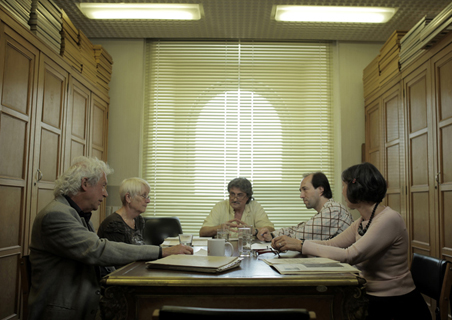Inspired by Polish writer Witold Gombrowicz’s 1937 novel Ferdydurke, in which obsession with youth and the new takes an absurd and unnatural form, The Offence is a short story in the form of a film. The narrative follows a chorus of characters in a provincial Hungarian town, obsessed with tradition and fearful of the unknown. The unassuming hero of the story is a town official who decides to rescue his fellow citizens from their backwardness by an unusual method: with an uncanny understanding of the human desire for perversion, he forces progress through unnecessary prohibitions and restrictions that he knows will be broken. The film is about the paradoxically liberating effects of censorship, capable of attuning society to its needs and desires.
The Offence was shot in Hungary in the summer of 2013, in reaction to a conservative political climate. Like Breguła’s more recent works, it addresses the complex relationships between non-specialist or “uninitiated” art audiences and the abstractions of modern art.
Karolina Breguła is a Polish multimedia artist based in Warsaw who creates installations, happenings, video, and photography. She is currently a PhD candidate at the National Film, Television, and Theatre School in Łódź. Her work has been presented at the 55th Venice Biennale, Sweden’s Kalmar Museum of Art, the Polish National Museum, and the Centre for Contemporary Art Ujazdowski Castle (Warsaw), among other institutions. Breguła is the recipient of a Polish Ministry of Culture scholarship, the Visegrad, and won a second-place Views Art Prize, Poland’s most prestigious artist prize.
The Offence was written and directed by Breguła, with cinematography by Robert Mleczko, sound by Weronika Raźna, and editing by Stefan Paruch. It was produced by Breguła and Tamas Liszka.
—Chelsea Haines for Guernica
